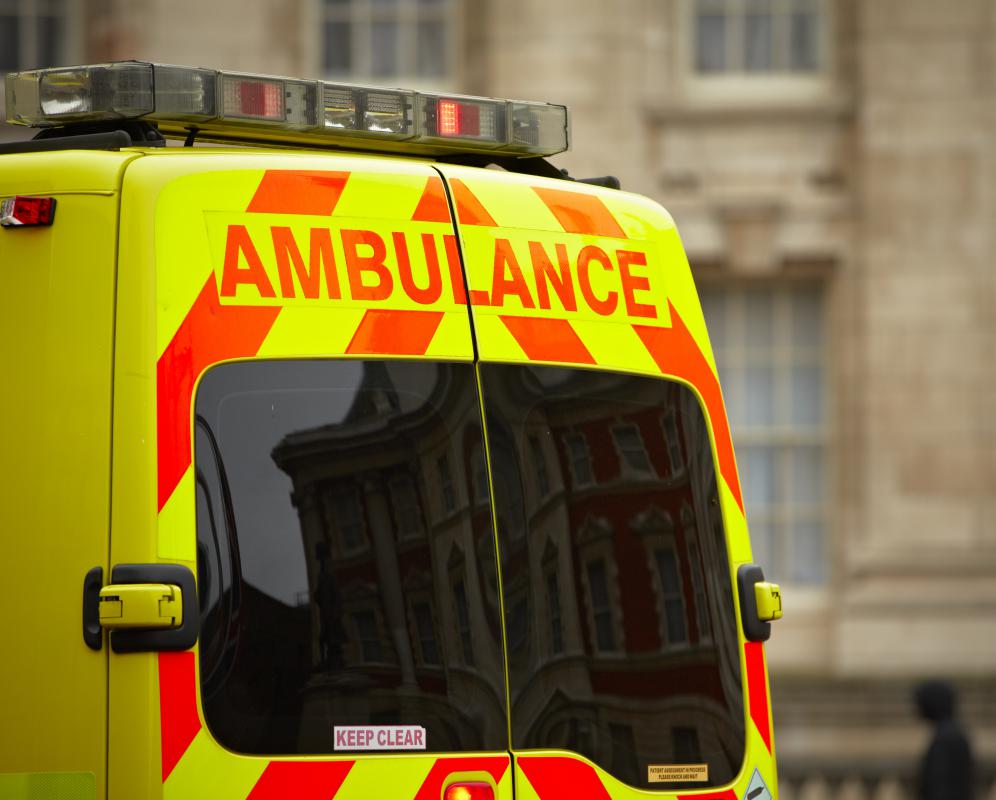At WiseGEEK, we're committed to delivering accurate, trustworthy information. Our expert-authored content is rigorously fact-checked and sourced from credible authorities. Discover how we uphold the highest standards in providing you with reliable knowledge.
What Are the Different Types of Treatment for Hypovolemic Shock?
Treatment for hypovolemic shock includes maintaining body temperature to prevent hypothermia, and elevating the feet to facilitate circulation. Hypovolemic shock is a serious medical condition that can occur as a result of severe fluid and blood loss. This condition causes undue stress on the heart, rendering it ineffective to adequately pump blood throughout the body, which can result in multiple organ failure. It can be caused by internal bleeding, bleeding from injuries, excessive diarrhea and burns.
The symptoms of hypovolemic shock can include cold, clammy skin, decreased urinary output, anxiety and confusion. People also sometimes experience rapid breathing, pale skin, low blood pressure and a fast pulse. This condition is a medical emergency, and when symptoms occur, emergency medical treatment needs to be sought to prevent cardiac and respiratory arrest, as well as multiple organ failure. Treatment for hypovolemic shock at the hospital will include the replacement of fluids or blood through an intravenous line. The intravenous line may be initiated in the ambulance prior to arriving at the hospital or initiated in the emergency room upon arrival at the hospital.

Another important treatment for hypovolemic shock includes the administration of medications such as epinephrine, dopamine and norepinephrine, which increase blood pressure and improves cardiac output. The health care provider will also need to monitor heart function with a catheter inside the heart and monitor urine production. If treatment is not quickly instituted, complications such as brain damage, heart attack, gangrene and kidney damage can occur.

Elderly people and those with certain medical conditions are more prone to poor outcomes related to hypovolemic shock. Those with lesser degrees of hypovolemic shock are more likely to fare better than those with more extensive cases of hypovolemic shock. The prognosis might also depend upon the amount of blood that has been lost, the injury or illness that caused the blood loss, and the rate of fluid or blood loss.

When transporting the individual to the hospital when seeking treatment for hypovolemic shock, he should be carried flat with this feet elevated and head down. The head and neck should also be stabilized before moving the person, especially if a spinal injury or neck injury is suspected. If the patient is still conscious, he should never be allowed to consume fluids by mouth in an attempt to restore fluid or blood volume. This can cause the individual to aspirate, or inhale, fluids into his lungs, which may promote pneumonia or respiratory failure.
AS FEATURED ON:
AS FEATURED ON:


















Discussion Comments
My mom decided she knew what was best and started taking aspirin and ibuprofen together because she said that helped her arthritis.
She was having spells of weakness, and finally we called an ambulance after she fell. They got her to the hospital and the ER doctor determined she had blood loss from internal bleeding. She ended up needing three units of blood. The doctor did an endoscopy on her and it was fine. He said it was the aspirin/ibuprofen combination that had started the bleeding. She had vowed and declared that couldn't be the cause, but I knew better. We got the ibuprofen out of the house and she hasn't had another episode since.
A co-worker's daughter experienced this as a complication of pregnancy. She had a placental abruption. She had been feeling poorly and her mom had called her OB and was on the way to his office. Her daughter started bleeding and the doctor said he would meet them at the ER, when her daughter just started hemorrhaging in the car. It was awful. She drove straight to the ER and they got her in immediately.
Her heart stopped four times because of the blood loss, but they were able to get the bleeding stopped, finally. They delivered the baby, too. He was only a little early, and weighed over four pounds. It was touch and go for a while, but both survived. Her mom said they ran in something like 10 or 15 units of blood.
Post your comments